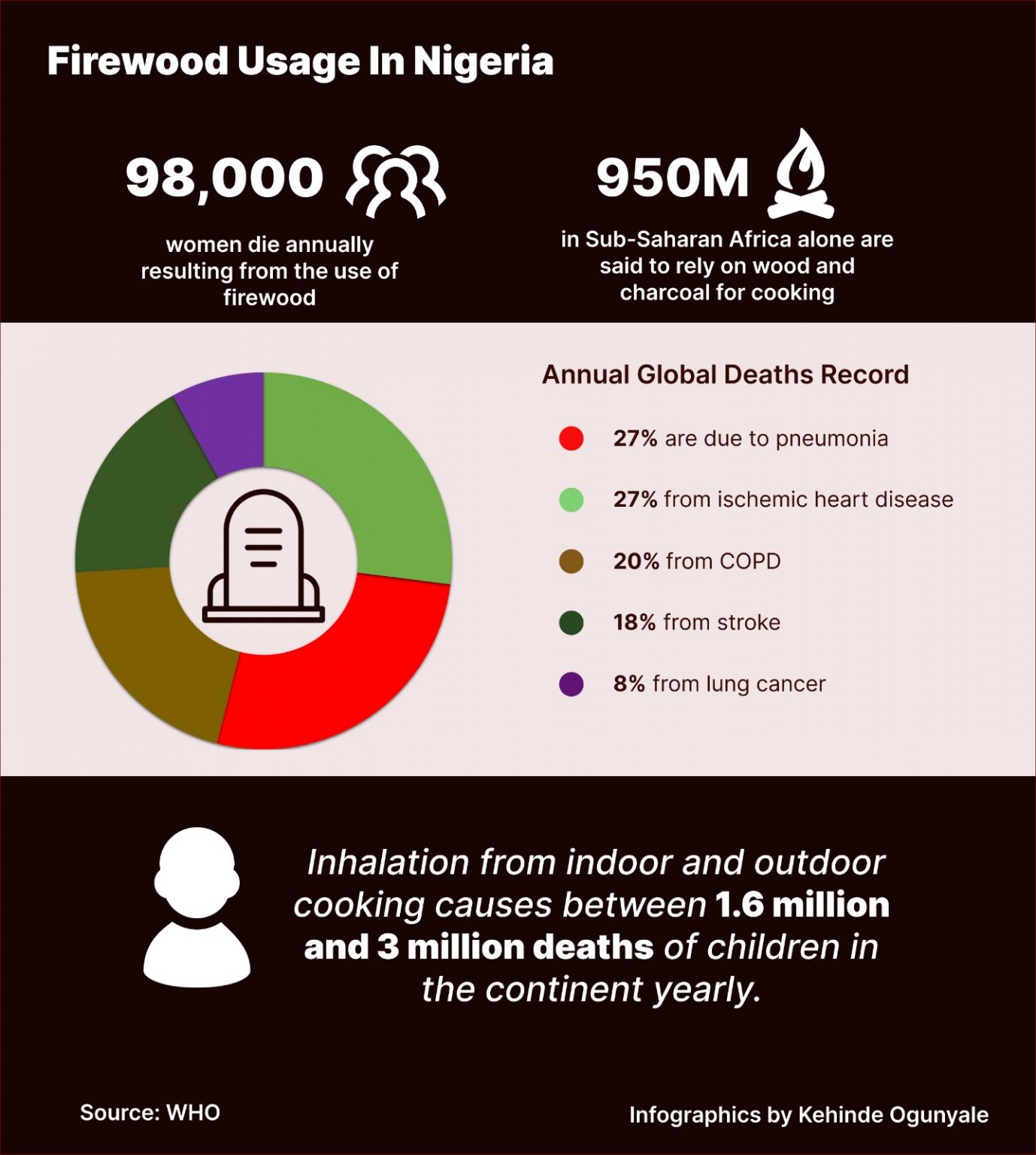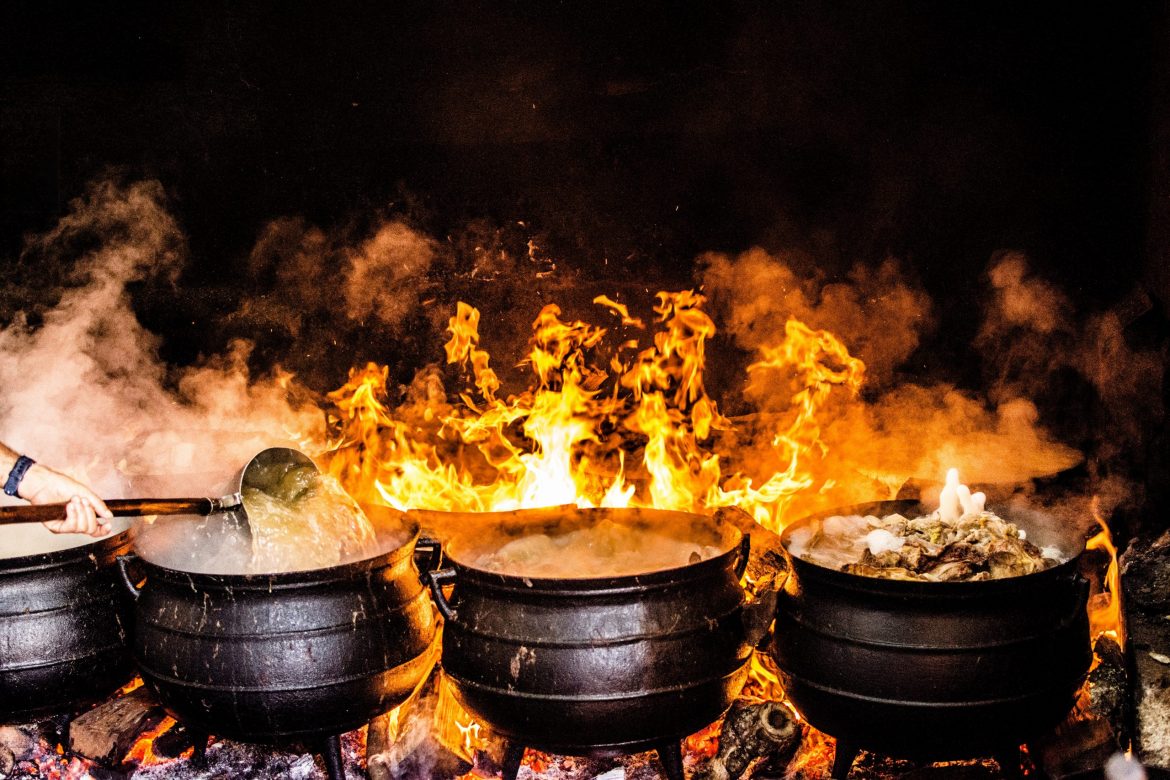Data from the Global Alliance for Clean Cookstoves, a public-private partnership that seeks to promote clean and efficient household cooking solutions, shows that the use of open fires and solid fuels for cooking remains one of the world’s most pressing health and environmental problems, directly impacting close to half the world’s population and causing nearly four million premature deaths each year.
In Sub-Saharan Africa alone, some 950 million people- about 81 per cent of the population- are said to rely on wood and charcoal for cooking, a number which is estimated to grow to 1.67 billion by 2050.
In a study conducted in 2020, 77.7 per cent of Nigerian households said they have been cooking over open fire, responsible for over 77,000 deaths annually through lung and heart diseases. 13.9 per cent of households also said they usually cooked over an open stove.
Among the health issues arising from smoke inhalation In developing countries, including Nigeria are respiratory infections, eye damage, heart and lung disease lung cancer, cardiovascular diseases and bronchitis which are significant causes of death in both children under five and women.

Apart from its health implications, Cooking with firewood in open fire is a major driver of deforestation in Nigeria, contributing to the loss of nearly 400,000 hectares of forests annually. Emissions from residential cooking represent about 55 million metric tonnes of CO2e and about 700,000 metric tonnes of harmful fine particulate matter (PM2.5) emissions which constitutes a significant proportion of Nigeria’s total greenhouse gas emissions
Taking action and the National Clean Cooking Policy
To tackle the widespread dependence on fuelwood for cooking and create a pathway towards the adoption of clean cooking technologies and empowerment of communities to lead healthier and more environmentally conscious lives, the Federal Ministry of Environment developed the National Clean Cooking Policy which was approved by the Federal Executive Council, (FEC) on 25th March 2024.
Among other things, the policy seeks to expand access to clean cooking energy solutions to all households and institutions in Nigeria by 2030. This will assist Nigeria to improve health, create jobs, build livelihoods, protect the environment, and help families, institutions and businesses save time and money by promoting clean cooking solutions.

Innovative cooking solutions showcased at the Clean Cooking fair
Consistent with the Energy Transition Plan, the goal of the National Policy on Clean Cooking will lay the foundation for the achievement of the Federal Government’s long-term vision of a carbon-neutral clean cooking future by the year 2060.
The policy was launched during the 17th Session of the National Council on Environment and transmitted to Sub-National Governments, Relevant Public Sector Stakeholders, Civil Society Organizations and Development Partners for necessary actions.
Upon approval by the Federal Executive Council, Nigeria’s President Bola Tinubu directed the immediate implementation and domestication at the sub-national level which prompted the Ministry through the Department of Climate Change to constitute a National Implementation Committee to drive the process and seek support to develop a comprehensive Implementation Plan and Monitoring and Evaluation Framework for the Policy.
The National Clean Cooking Fair
As part of activities flagging off the implementation of the National Clean Cooking Policy, the Federal Ministry of Environment, with support from the European Union, held a Clean Cooking Fair. The fair also provided an opportunity to create awareness and sensitize the public on the importance of promoting sustainable and clean cooking practices across the nation.

Nigeria’s Minister of Environment, Balarabe Abbas speaking during the fair
The Fair also provided a platform for showcasing practicable solutions and opportunities in the clean cooking industry. The new cooking innovations showcased will make it possible for communities to enjoy healthy meals while protecting the health and environment from the hazards caused by inefficient cooking methods.
Speaking during the fair, which was held at Abuja Inter-Continental Hotel on Thursday, July 18, Nigeria’s Minister of Environment, Balarabe Abbas, said that it represents Nigeria’s collective commitment to sustainable development, environmental stewardship and improving the quality of lives of millions of Nigerians.
He said that clean cooking remains a crucial component of the government’s efforts to address environmental challenges, improve public health and enhance the well-being of communities.
He, however, regretted that each year, thousands of lives are lost due to indoor air pollution caused by the inefficient burning of biomass fuels, adding that deforestation and environmental degradation continue to accelerate as thousands of trees are cut down for fuel.
“Consequently, all stakeholders are advised to henceforth adopt cleaner cooking technologies and practices to urgently mitigate the negative impacts of climate change caused by traditional cooking methods, “he said.
Abbas thanked the European Union for its unwavering support and partnership in these initiatives and all stakeholders who have contributed immensely to the development of environmental sustainability in Nigeria.
Commitment to GHG reduction
During the fair, the Minister also told participants that the Ministry of Environment, through collaborative projects and programs with the Nigeria Clean Cooking Alliance, was also working tirelessly to ensure the reduction in Green House Gas Emissions as a result of traditional cooking methods.
He noted that the Ministry was ready to work with local artisans and entrepreneurs to manufacture and distribute subsidized clean cooking stoves, creating jobs and stimulating local economies.
“We are also committed to the United Nations Framework Convention on Climate Change aimed at reducing global Green House Gas Emissions,” he said. “To ensure a comprehensive implementation roadmap and activities of the Policy, the Ministry had also set up an implementation Committee for the National Clean Cooking Policy,”.
Providing access to cooking gas for 28.8 million Nigerians
In his address, the Minister of State for Environment, Dr Iziaq Salako, said that Nigeria has pledged to provide access to cooking gas for 28.8 million households and improve biomass cook-stoves for 7.3 million, representing 48% and 13% respectively by 2030.

Nigeria’s Minister of State for Environment, Dr. Iziaq Salako during the fair
He noted that when delivered, the intervention is expected to save over 30,000 lives per annum, build a domestic clean cooking industry and create new jobs, reduce deforestation, assist the government in meeting its climate change commitments like the pledge to reduce Short-Lived Climate Pollutants (SLCP) and improve the lives of women and girls in general.
“Clean cooking is not merely a matter of convenience but a matter of public health concern, a fundamental human right which is an essential component of sustainable development, “he said. “By transitioning to cleaner and more efficient cooking technologies, we can improve air quality, protect public health, and mitigate the impacts of climate change in our communities,”.
He explained that a strong regulatory framework, collaboration, exchange of knowledge and partnerships are needed to achieve these clean cooking targets.
Feature image source: Devon Rockola from Pexels.
